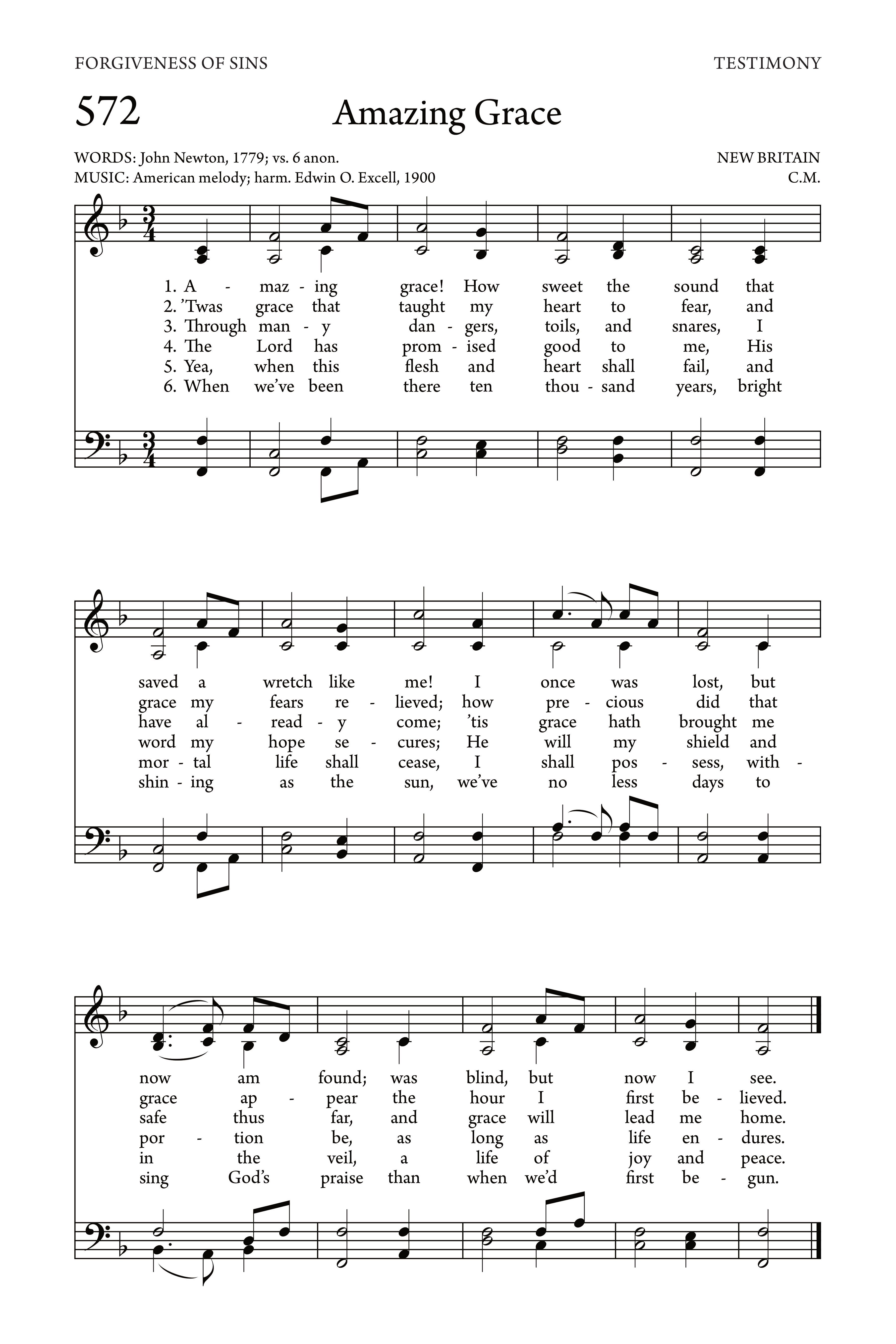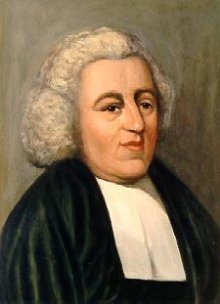Amazing grace! (how sweet the sound)
By John Newton
Lyrics
that saved a wretch like me!
I once was lost, but now am found,
was blind, but now I see.
and grace my fears relieved;
how precious did that grace appear
the hour I first believed!
I have already come:
'tis grace has brought me safe thus far,
and grace will lead me home.
his word my hope secures;
he will my shield and portion be
as long as life endures.
and mortal life shall cease:
I shall possess, within the veil,
a life of joy and peace.
the sun forbear to shine;
but God, who called me here below,
will be forever mine.
Bible Reference
Genesis 15:1-6
About This Hymn
Author: John Newton (1725–1807)
Music: From Virginia Harmony, compiled by James P. Carrell and David S. Clayton, 1831
Tune Name: Amazing Grace
Meter: Common Meter (86.86)
Scripture References: 1 Chronicles 17:16–17; Ephesians 2:8–9
“For by grace are ye saved through faith; and that not of yourselves: it is the gift of God: not of works, lest any man should boast.” – Ephesians 2:8–9 (KJV)
In a quiet parish churchyard in Olney, England, a simple granite tombstone marks the resting place of one of history’s most influential hymn writers. The inscription reads: “John Newton, clerk, once an infidel and Libertine, a servant of slavers in Africa, was, by the rich mercy of our Lord and Savior Jesus Christ, preserved, restored, pardoned, and appointed to preach the Faith he had long labored to destroy.” These words, composed by Newton himself before his death, succinctly capture the extraordinary transformation of a man who once trafficked in human misery but came to proclaim the boundless grace of God through word and song.
John Newton was born in London on July 24, 1725. His mother, a devout Christian, died when he was just six years old. Soon after, he left home to join his father, a merchant seaman, and began life at sea by the age of eleven. His early years were marked by rebellion, profanity, and moral decline. He spent time on various ships and even worked on the West African coast in the slave trade. Eventually, Newton became captain of his own slave ship, transporting enslaved Africans to the Americas—a trade he would later denounce in horror and shame.
A turning point came on March 10, 1748. During a violent storm on a voyage from Africa to England, Newton began reading The Imitation of Christ by Thomas à Kempis. The terrifying experience and the spiritual message of the book deeply affected him, and it marked the beginning of his conversion to Christianity. Though he continued in the slave trade for some years—justifying his role by improving conditions aboard his ship—his conscience could no longer bear the inhumanity. Eventually, he abandoned the trade and became an outspoken advocate for abolition.
After marrying his longtime sweetheart, Mary Catlett, in 1750, Newton worked as a clerk at the Port of Liverpool. During this time, he felt a growing call to ministry. Influenced by prominent evangelicals like George Whitefield and John and Charles Wesley, Newton studied diligently and chose to remain within the Anglican Church. At age thirty-nine, he was ordained and accepted a pastorate in Olney, near Cambridge. His ministry there, lasting fifteen years, was marked by passionate preaching, evangelistic outreach, and heartfelt hymn-singing—often replacing the traditional Psalms with more expressive spiritual songs.
Unable to find hymns that reflected the personal nature of his message, Newton began writing his own. He partnered with his friend and neighbor, the poet William Cowper, and together they compiled the Olney Hymns in 1779—a landmark collection of 349 hymns (67 by Cowper and the remainder by Newton). Newton described its purpose as “a desire to promote the faith and comfort of sincere Christians.” One of the most enduring hymns from this volume is “Amazing Grace,” originally titled “Faith’s Review and Expectation.” Based on 1 Chronicles 17:16–17, it reflects Newton’s deep sense of awe and gratitude for God's mercy in his life.
Newton’s ministry later moved to the influential St. Mary Woolnoth Church in London, where he served for 28 years. His impact extended far beyond his pulpit. He mentored men like Claudius Buchanan, a future missionary to India, and Thomas Scott, a noted Bible commentator. Most significantly, Newton befriended and encouraged William Wilberforce, a key leader in the British movement to abolish slavery. The year Newton died—1807—was the same year the British Parliament passed the Act for the Abolition of the Slave Trade, a cause Newton had passionately championed.
After his wife Mary died of cancer in 1790, Newton endured seventeen years without her. In 1893, both were reinterred in the churchyard at Olney, where their tombstone remains a powerful witness to God’s redeeming love. Even in his final days, Newton remained fervent in faith. When advised to retire due to poor health and fading memory, he famously replied, “What? Shall the old African blasphemer stop while he can still speak?” Near the end of his life, he declared, “My memory is nearly gone, but I remember two things: That I am a great sinner, and that Christ is a great Savior.”
The original version of “Amazing Grace” included six stanzas. Though many modern hymnals feature only four, Newton’s additional verses deepen the hymn’s reflection on hope, eternity, and divine assurance. Three lesser-known but historically authentic stanzas are:
-
The Lord has promised good to me, His Word my hope secures;
He will my shield and portion be, as long as life endures. -
Yes, when this heart and flesh shall fail, and mortal life shall cease,
I shall possess within the veil a life of joy and peace. -
The earth shall soon dissolve like snow, the sun forbear to shine;
But God, who called me here below, will be forever mine.
The tune commonly associated with “Amazing Grace” is a traditional American folk melody. Its earliest known publication appeared in the 1831 hymnal Virginia Harmony, where it was linked to the text under the title “Loving Lambs.” This melody, simple and soulful, became the perfect vehicle for Newton’s heartfelt lyrics. Throughout the 19th century, the hymn appeared in countless hymnals, especially in the American South, and eventually gained global recognition.
In addition to “Amazing Grace,” Newton is also remembered for other significant hymns, such as “Glorious Things of Thee Are Spoken.” Yet it is “Amazing Grace”—with its timeless message of redemption and hope—that most fully captures the essence of John Newton’s life and testimony: from a wretch to a witness, from the depths of sin to the heights of grace.


📬 Subscribe to Our Devotional Updates
Receive weekly hymns, devotionals, and website features directly in your inbox.
Hymn Information

- Category: Hymn
- Author/Writer: John Newton (1779)
- Added: May 16, 2025
- Last Updated: June 5, 2025
- Views: 3441
To view the author's biography, click their name above.
MIDI File
Popular Hymns
Recent Blog Posts
Popular Blog Posts
Visit Us on Social Media
Latest from X (Twitter)
Tweets by HymnalLibraryLatest from Facebook
Latest on YouTube
Daily Bible Verse
Disclaimer
The hymns, sheet music, MIDI files, and related content on this website are provided for educational and research purposes only.
- Public Domain: Many of the hymns featured here are in the public domain and may be freely used.
- Copyrighted Works: Some hymns may still be under copyright protection. Where applicable, permission has either been requested from the copyright owner, or the content is shared under the principles of fair use for educational purposes.
⚠️ Important Notice: If you wish to reproduce, distribute, or use any copyrighted hymn beyond personal study or educational use, you must obtain permission directly from the copyright holder. This website does not grant any rights for commercial use yet.
If there is any other question please address it to us in our Contact Page, for further assistance. Thank you for using the site. May God Bless You.













 John Newton (1725–1807) was an English Anglican cleric, hymn writer, and prominent figure in the evangelical movement whose life story of conversion and service has inspired Christians for centuries. He was born in Wapping, London, England, on July 24, 1725, into a Christian home, but his mother died when he was young, and he went to sea with his father at age eleven. As a youth and young man he lived a reckless life at sea, was pressed into service in the Royal Navy, and later worked aboard slave ships in the trans-Atlantic slave trade, even becoming a ship’s captain for years. A severe storm at sea in 1748 led him to cry out to God and marked the beginning of his spiritual turning toward Christ, a change that grew more fully over subsequent years.
John Newton (1725–1807) was an English Anglican cleric, hymn writer, and prominent figure in the evangelical movement whose life story of conversion and service has inspired Christians for centuries. He was born in Wapping, London, England, on July 24, 1725, into a Christian home, but his mother died when he was young, and he went to sea with his father at age eleven. As a youth and young man he lived a reckless life at sea, was pressed into service in the Royal Navy, and later worked aboard slave ships in the trans-Atlantic slave trade, even becoming a ship’s captain for years. A severe storm at sea in 1748 led him to cry out to God and marked the beginning of his spiritual turning toward Christ, a change that grew more fully over subsequent years.